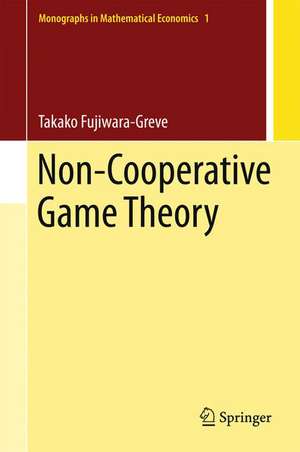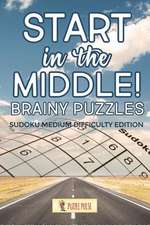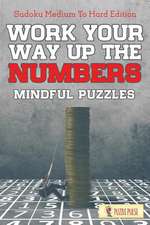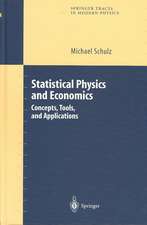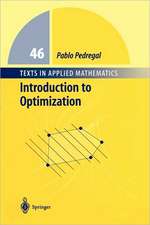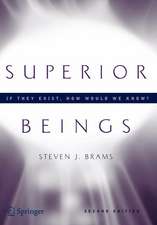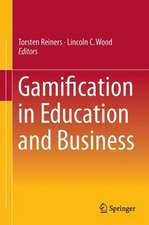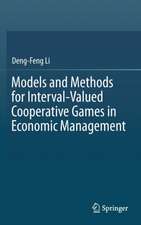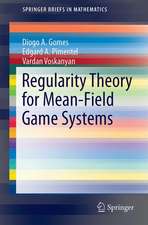Non-Cooperative Game Theory: Monographs in Mathematical Economics, cartea 1
Autor Takako Fujiwara-Greveen Limba Engleză Hardback – 27 iun 2015
Game theory consists of non-cooperative games and cooperative games. This book covers only non-cooperative games, which are major tools used in current economics and related areas. Non-cooperative game theory aims to provide a mathematical prediction of strategic choices by decision makers (players) in situations of conflicting interest. Through the logical analyses of strategic choices, we obtain a better understanding of social (economic, business) problems and possible remedies. The book contains many well-known games such as the prisoner’s dilemma, chicken (hawk–dove) game, coordination game, centipede game, and Cournot, Bertrand, and Stackelberg models in oligopoly. It also covers some advanced frameworks such as repeated games with non-simultaneous moves, repeated games with overlapping generations, global games, and voluntarily separable repeated prisoner’s dilemma, so that readers familiar with basic game theory can expand their knowledge. The author’s own research is reflected in topics such as formulations of information and evolutionary stability, which makes this book unique.
| Toate formatele și edițiile | Preț | Express |
|---|---|---|
| Paperback (1) | 613.39 lei 6-8 săpt. | |
| Springer – 23 oct 2016 | 613.39 lei 6-8 săpt. | |
| Hardback (1) | 662.76 lei 6-8 săpt. | |
| Springer – 27 iun 2015 | 662.76 lei 6-8 săpt. |
Preț: 662.76 lei
Nou
Puncte Express: 994
Preț estimativ în valută:
126.81€ • 132.42$ • 104.72£
126.81€ • 132.42$ • 104.72£
Carte tipărită la comandă
Livrare economică 15-29 aprilie
Preluare comenzi: 021 569.72.76
Specificații
ISBN-13: 9784431556442
ISBN-10: 4431556443
Pagini: 280
Ilustrații: XI, 260 p. 64 illus.
Dimensiuni: 155 x 235 x 20 mm
Greutate: 5.33 kg
Ediția:2015
Editura: Springer
Colecția Springer
Seria Monographs in Mathematical Economics
Locul publicării:Tokyo, Japan
ISBN-10: 4431556443
Pagini: 280
Ilustrații: XI, 260 p. 64 illus.
Dimensiuni: 155 x 235 x 20 mm
Greutate: 5.33 kg
Ediția:2015
Editura: Springer
Colecția Springer
Seria Monographs in Mathematical Economics
Locul publicării:Tokyo, Japan
Public țintă
GraduateTextul de pe ultima copertă
This is a textbook for university juniors, seniors, and graduate students majoring in economics, applied mathematics, and related fields. Each chapter is structured so that a core concept of that chapter is presented with motivations, useful applications are given, and related advanced topics are discussed for future study. Many helpful exercises at various levels are provided at the end of each chapter. Therefore, this book is most suitable for readers who intend to study non-cooperative game theory rigorously for both theoretical studies and applications.
Game theory consists of non-cooperative games and cooperative games. This book covers only non-cooperative games, which are major tools used in current economics and related areas. Non-cooperative game theory aims to provide a mathematical prediction of strategic choices by decision makers (players) in situations of conflicting interest. Through the logical analyses of strategic choices, we obtain a better understanding of social (economic, business) problems and possible remedies. The book contains many well-known games such as the prisoner’s dilemma, chicken (hawk–dove) game, coordination game, centipede game, and Cournot, Bertrand, and Stackelberg models in oligopoly. It also covers some advanced frameworks such as repeated games with non-simultaneous moves, repeated games with overlapping generations, global games, and voluntarily separable repeated prisoner’s dilemma, so that readers familiar with basic game theory can expand their knowledge. The author’s own research is reflected in topics such as formulations of information and evolutionary stability, which makes this book unique.
Game theory consists of non-cooperative games and cooperative games. This book covers only non-cooperative games, which are major tools used in current economics and related areas. Non-cooperative game theory aims to provide a mathematical prediction of strategic choices by decision makers (players) in situations of conflicting interest. Through the logical analyses of strategic choices, we obtain a better understanding of social (economic, business) problems and possible remedies. The book contains many well-known games such as the prisoner’s dilemma, chicken (hawk–dove) game, coordination game, centipede game, and Cournot, Bertrand, and Stackelberg models in oligopoly. It also covers some advanced frameworks such as repeated games with non-simultaneous moves, repeated games with overlapping generations, global games, and voluntarily separable repeated prisoner’s dilemma, so that readers familiar with basic game theory can expand their knowledge. The author’s own research is reflected in topics such as formulations of information and evolutionary stability, which makes this book unique.
Caracteristici
Provides a rigorous but easy-to-understand explanation of non-cooperative game theory Is organized by equilibrium concepts, not classes of games, making clear that an equilibrium is a prediction method for a variety of games Benefits students who want to go beyond introductory game theory Includes supplementary material: sn.pub/extras
